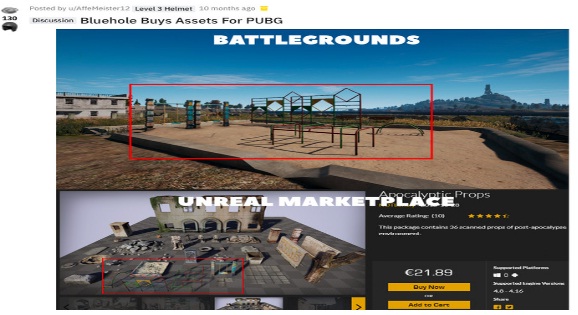Player Unknown’s Battlegrounds (PUBG) is widely known to be the game that fired the starting bullet on the battle royale gaming genre.
Although the game has gained wide popularity across the world, it’s also not been immune to accusations.
The most recent claim gossiped in gaming circles is that PUBG developers took the “asset flip” shortcut.
This term is used to refer to a game that is developed mostly from premade assets found on the stores, as opposed to original models created by the developers.
Here is a picture that has been widely circulated to substantiate the claims:

Gamers usually refer to a game as an asset flip if they recognize that it has assets like the ones on an online store. This implies that the game has been cheaply constructed using already available assets.
An asset flip can have a negative connotation since it suggests that the game’s developers are lazy and cannot spend their time and resources to build original and creative models.
Worse still, if this term is used to refer to a very popular game like PUBG, it definitely raises a lot of eyebrows.
PUBG developers fight back
PUBG creators have strongly pushed back the accusations that the game is an asset flip. PUBG developer, Brendan Greene, and PUBG Corporation communications lead, Ryan Rigney, have both decried the allegations.
At an interview at the E3 game convention, Greene asserted that the claims are very frustrating and that they “kill him a little inside.”
On his part, Rigney explained that the development of PUBG relied on store-purchased assets at first, because that was the best way to avoid reinventing the wheel and achieve fast and cost-effective production.
He quotes one of the team members:
“Why should one of my artists spend two weeks on a generic sculpt if they could instead spend that two weeks adding real value for players elsewhere?
How many times should a telephone booth be modeled? How many times do we gotta sculpt a cash register?”
Rigney acknowledged that some of the game’s parts are built using a combination of store-purchased assets and in-house created content “because it just doesn’t make sense to build everything in the game world yourself.”
He added that “the majority of the external assets are adjusted by our artists after the fact for visuals and for optimization/performance.”
Nonetheless, as the PUBG team grows, Rigney emphasized that the team will develop more original content as opposed to depending on store-purchased assets.
Wrapping up
The team at PUBG have done an excellent work at combining in-house and external assets to create a stellar game.
While calling PUBG an asset flip game may not be accurate, as explained by the game’s developers, it is highly popular mainly because of the creators’ ability to integrate a unique gameplay experience that completely immerses the fans into the action.
You can also learn how to build awe-inspiring games like the PUBG that can be an obsession for millions of people around the world.
For example, Shieldgenerator, who has more than 7 years of experience in game development, teaches beginners how to build amazing games using the Unity platform.
You can learn from him and advance your game development skills.
Success in developing your next game!







